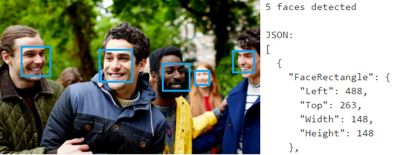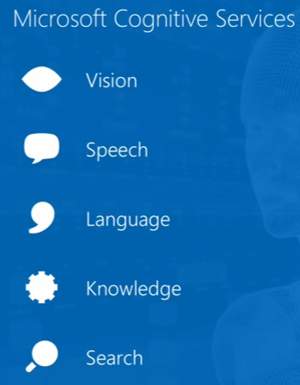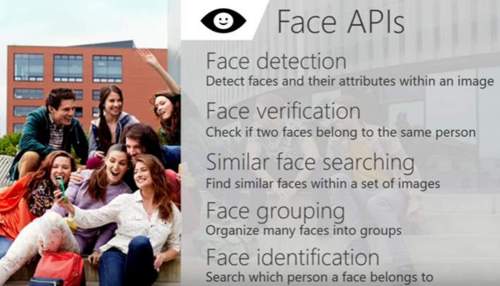| Microsoft Cognitive Services APIs Released |
| Written by Sue Gee | |||
| Friday, 21 April 2017 | |||
|
Microsoft has announced the General Availability on Azure of its Face API and Computer Vision API to give developers easy tools for handling and interpreting images. The Content Moderator is the third of the newly released APIs. The Face API was among the first of the Project Oxford Artificial Intelligence APIs originally announced in April 2015 at Build. At that time it offered four REST-based APIs, the others being Speech, Vision and Language, which were available for developers to use to incorporated AI from machine learning into their own apps without having to spend time on training.
We've already had a great deal of fun with the Face API's abilities to estimate age, identify twins, detect emotion and the Vision API's prowess to recognize dogs and their breed thanks to demo apps built to show off the capabilities of Project Oxford APIs. And,as the APIs were open source, so have lots of other people. At last year's Build Project Oxford Microsoft Cognitive Services, by which time a collection of 21 APIs were available in various stages of preview. The number of APIs under the Cognitive Services umbrella has now grown to 25 in five categories:
The announcement of the general availability of Face API, Computer Vision API and Content Moderator API was made at the Microsoft Data Amp online event. It came from Ana Roth, the Program Manager on the Microsoft Cognitive Services team and you can see her 8-minute contribution in this video:
She points out three advantages of using Microsoft Cognitive Services to add artificial intelligence capabilities to an app:
Then comes news that three APIs that now just reached GA status. The first to be covered is the Face API, which detects human faces and compares similar ones, organizes people into groups according to visual similarity, and identifies previously tagged people. The new feature according to Anna is the ability to identify people's emotions in images as well as age and gender.
There are new features too in the Computer Vision API, which provides the tools to understand the contents of any image. As well as creating tags that identify objects, celebrities, or actions in an image, and craft coherent sentences to describe them which we have already seen in action (see our introduction to its captioning capabilities) you can now detect landmarks in images. Handwriting detection has also been added but this feature is still in preview. Examples of how to use landmark detection and handwriting recognition are included in the Microsoft Cognitive Services blog post. Content Moderator is the third of the trio. It provides machine assisted moderation of text and images, augmented with human review tools. Video moderation is available in preview as part of Azure Media Services. Like the other APIs it can be tried for free and has a free tier, in this case 1 call per second for up to 5000 calls per month.
More InformationMicrosoft Cognitive Services blog post Pricing for Microsoft Cognitive Services Related ArticlesMicrosoft Cognitive Toolkit Version 2.0 Beta Conversation and Cognition at Build 2016 MIcrosoft's Project Oxford AI APIs For The REST Of Us Emotion Detection Using Project Oxford What's That Dog - An App For Breed Recognition How Old - Fun, Wrong, Potentially Risky? Amazon Rekognition Can Now Estimate Your Age
To be informed about new articles on I Programmer, sign up for our weekly newsletter, subscribe to the RSS feed and follow us on Twitter, Facebook or Linkedin.
Comments
or email your comment to: comments@i-programmer.info
|
|||
| Last Updated ( Friday, 21 April 2017 ) |






